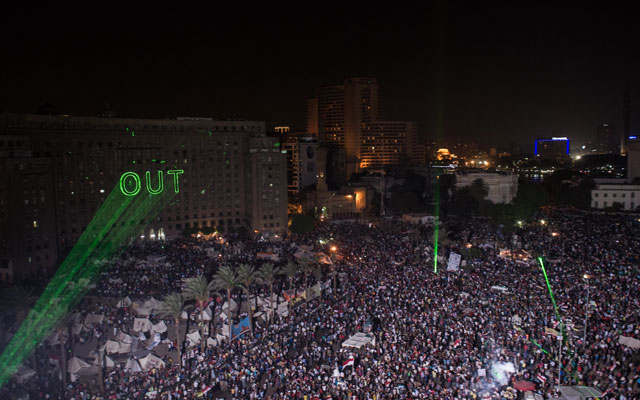Egypt: Who’s Who in the Transitional Government
Charlotte Florance /
Egypt’s former President Mohamed Morsi no longer controls the purse strings or answers the direct line in the presidential palace. So who exactly is running Egypt’s political and economic affairs?
The interim cabinet, comprised largely of anti-Morsi supporters and technocrats, now governs the country. Prime Minister Hazem El Beblawi has said the cabinet’s top priorities will be to restore security, ensure the flow of goods and services, and prepare for parliamentary and presidential elections. The new cabinet is comprised of 33 ministers, including three women and three Christians—but no Islamists.
The only Islamist party that supported the army’s removal of Morsi, the al-Nour Party, declined positions in the interim government (as did the Muslim Brotherhood). Discouraged by the transitional process underway in Egypt, the al-Nour Party is now suggesting that, if the anti-Morsi coalition does not build an inclusive government, it is likely to repeat the same mistakes Morsi was blamed for.
Here are thumbnail sketches of 10 prominent cabinet ministers:
1. Hazem El Beblawi, prime minister:
- Founder of the Social Democratic Party;
- Classical liberal economist and proponent of reducing Egypt’s vast subsidies;
- Under-Secretary-General of the United Nations, 1995–2000;
- Head of the Export Development Bank of Egypt, 1983–1995;
- Minister of finance in the interim cabinet, July–October 2011 (resigned from the post in protest after the security forces killed 28 Coptic Christians).
2. Mohamed El Baradei, vice president for international relations:
- Director general of the International Atomic Energy Agency, 1997–2000;
- Head of the National Salvation Front, a coalition of leftist and secular groups;
- Considered to be the front-runner to lead the 2013 interim government but was strongly opposed by the al-Nour Party.
3. Abdel-Fattah El Sisi, first deputy prime minister and minister of defense:
- Head of military intelligence when Hosni Mubarak was ousted in 2011;
- Youngest member of the Supreme Council of the Armed Forces, which ruled Egypt in the interim after Mubarak was ousted;
- Appointed as minister of defense by Morsi in August 2012.
4. Ziad Bahaa El Din, deputy prime minister and minister for planning and international cooperation:
- Founding member of the Egyptian Social Democratic Party;
- Member of the now-dissolved 2012 parliament, in which he represented the Assiut region;
- Senior legal adviser to Egypt’s ministry of economy, 1997–2000;
- Candidate to lead the interim government but was opposed by the al-Nour Party.
5. Hossam Eissa, deputy prime minister and minister of higher education:
- Former member of Nasserist Party’s political bureau;
- Co-founder (with El Baradei) and head of the steering committee of the Constitution Party but resigned in March 2013 over internal divisions.
6. Ahmad Jalal, minister of finance:
- Director of the Economic Research Forum, a Cairo-based organization focusing on Middle East issues;
- Previously worked as an industrial economist, an economic advisor in private-sector development, and an adviser on the Middle East and North Africa for the World Bank.
7. Nabil Fahamy, minister of foreign affairs:
- Former ambassador to the United States (1999–2008) and Japan (1997–1999);
- Founding dean of the School of Public Affairs at the American University in Cairo.
8. Dorreya Sharaf El Din, minister of information:
- Directs influential state-run TV (which currently faces strong criticism in post-Mubarak Egypt);
- Hosted several television shows on state-owned and privately owned media channels;
- Served as the first undersecretary of the Information Ministry, heading the satellite division;
- Former member of the policies committee and the women’s committee of Mubarak’s now dissolved party, the National Democratic Party.
9. Mohamed Ibrahim, minister of interior:
- Originally appointed minister of interior in a cabinet reshuffle in January 2013 (one of the few ministers to retain his position after Morsi’s ouster);
- Former assistant minister for the Prisons Department;
- Criticized for deploying heavy police forces to protect the Muslim Brotherhood headquarters during anti-Morsi protests in Cairo.
10. Mohamed Amin El Mahdy, minister of transitional justice and national reconciliation:
- A newly created position that replaces the old post of minister of justice;
- Served as the sole Egyptian member of an International Criminal Court investigation into war crimes committed in the former Yugoslavia;
- Served on the U.N. tribunal for the assassination of Lebanese Prime Minister Rafiq Hariri in 2005.

